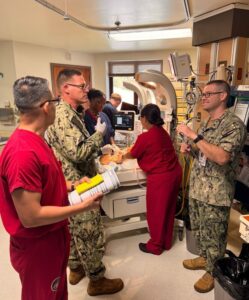
Story by Cmdr. Jenny Paul
U.S. Naval Hospital Rota
ROTA, Spain – The U.S. Naval Hospital Rota (USNH Rota) is resuming labor and delivery services on November 7, after six weeks of referring labor and delivery patients to local healthcare facilities. As a small military medical treatment facility (MTF) in southern Spain, USNH Rota relies on its strong partnerships with local network healthcare facilities to provide ready, reliable care for 8,400 beneficiaries within the area of responsibility. The hospital provides labor and delivery services for low-to medium-risk pregnancies and refers high-risk patients to local healthcare facilities for necessary care. Recently, USNH Rota faced a six-week period during which labor and delivery services were temporarily diverted to local healthcare facilities due to the unavailability of rapid neonatal transportation in the area.
During the period of diversion, USNH Rota worked closely with the Defense Health Agency (DHA), the overseas TRICARE contractor International SoS (ISoS), subject matter experts, and regional emergency medical transportation services to restore rapid neonatal transportation capabilities. Through its strong partnerships within the healthcare system in southern Spain, the MTF successfully re-established rapid emergency transport capabilities in the cities of Cadiz and Sevilla, as well as the Spanish public emergency air transportation system.
The hospital seized this opportunity to focus on continued process improvement and training. A multidisciplinary neonatal stabilization and transportation team established a training plan, which focused on neonatal airway and medication management, laboratory studies, and emergency response care coordination.
“We have a strong team here that continually works to improve outcomes and build on the relationships established with our Spanish partners,” reported Lt Cmdr. Alicia Sacks, a neonatal intensive care trained registered nurse at USHN Rota. “The safety of our patients is always our top priority, and this training afforded us the opportunity to execute critical skills and streamline workflows to foster a safer environment for everyone.”
This training ensured that USNH Rota staff across various departments remained proficient in neonatal and obstetrical care management and patient transportation processes.
All personnel supporting labor and delivery and neonatal care receive training and local certification in key care areas, including, but not limited to, neonatal resuscitation (NRP), the STABLE program (which is an acronym for six assessment and care modules unique to neonates), advanced life support in obstetrics (ALSO), and coordinated rapid response for obstetrical emergencies.
During the diversion, USNH Rota referred 18 patients to the local network for third trimester obstetrical care and delivery. The hospital’s referral and case management teams provided ongoing support to these patients, ensuring continuity of care as mothers and babies returned to USNH Rota after delivery.
The healthcare system within the Kingdom of Spain is highly rated and recognized for its access, quality, and patient outcomes. ”We value the high-quality of care that our patients receive in the network hospitals in our region. We work closely with ISoS and the Tricare Area Office to review the care provided and implement process improvements, when necessary,” said Navy Capt. Tyler Warkentien, Chief Medical Officer at USNH Rota.
USNH Rota resumed its labor and delivery services on November 7th and continues to collaborate with local partners and DHA experts to facilitate ongoing training, readiness and response drills, and specialist support, ensuring it remains a vital resource for expectant mothers and their families.
USNH Rota serves as a force multiplier in Navy Medicine’s strategic global medical support mission throughout Europe, Africa, and the Middle East while also supporting operational readiness and maintaining a strategic repository of expertise at the MTF within the Iberian Peninsula.
Navy Medicine – represented by more than 44,000 highly-trained military and civilian health care professionals – provides enduring expeditionary medical support to the warfighter on, below, and above the sea, and ashore.